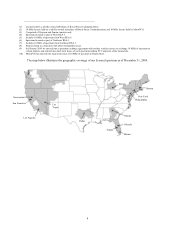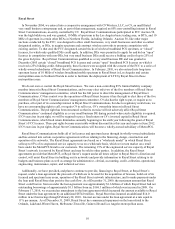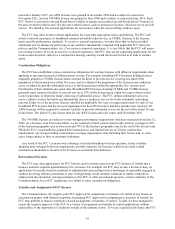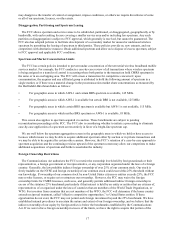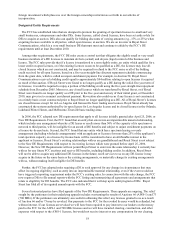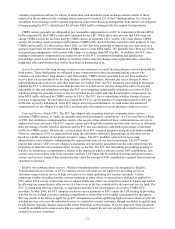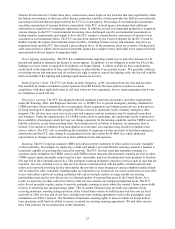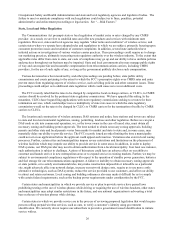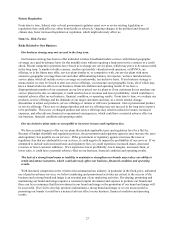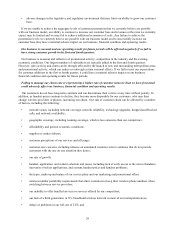Metro PCS 2009 Annual Report Download - page 31
Download and view the complete annual report
Please find page 31 of the 2009 Metro PCS annual report below. You can navigate through the pages in the report by either clicking on the pages listed below, or by using the keyword search tool below to find specific information within the annual report.19
construction, and other activities on the spectrum. We have constructed our Las Vegas, Philadelphia and New York
metropolitan networks on AWS-1 spectrum, and we only have AWS-1 spectrum in these metropolitan areas. If we
lost our AWS-1 licenses, we would cease being able to provide service in those metropolitan areas where we have
already launched service and would not be able to launch service in those markets where we have not yet launched
service.
In connection with the changes to the DE rules, the FCC also is considering whether additional restrictions should
be adopted in its DE program. Based on the FCC’s prior rulings, we do not expect any further changes in the DE
rules to be applied retroactively to Royal Street. We do not know what additional changes, if any, will be made to
the DE program as a result of this further rulemaking.
General Regulatory Obligations
The Communications Act and the FCC’s rules impose a number of requirements on wireless broadband mobile
services licensees. A failure to meet or maintain compliance with the Communications Act and the FCC’s rules
could subject us to fines, forfeitures, penalties, license revocations, or other sanctions, including the imposition of
mandatory reporting requirements, limitation on our ability to participate in future FCC auctions or acquisitions of
spectrum, and compliance programs and corporate monitors.
CMRS classification. Our wireless broadband mobile services are classified at the federal level as CMRS. The
FCC regulates providers of CMRS services as common carriers, which subjects us to many requirements under the
Communications Act and FCC rules and regulations. The FCC, however, has exempted CMRS services from some
typical common carrier regulations, such as tariff and interstate certification filings, which allows us and our
competitors to respond more quickly to competition in the marketplace. The FCC also is encouraged by federal law
to reduce unreasonable disparities in the regulatory treatment of similar wireless broadband mobile services, such as
cellular, broadband PCS, AWS, 700 MHz, and Enhanced Specialized Mobile Radio, or ESMR, services, and federal
law preempts state rate and entry regulation of CMRS providers.
The FCC has found, for the time being, that wireless broadband Internet access service offered at speeds in excess
of 200 kbps in at least one direction is an information service under the Communications Act, and thus is not subject
to traditional common carrier regulation. In addition, the FCC has found that the transmission component of wireless
broadband Internet access service meets the definition of telecommunications under the Communications Act and
that the offering of a telecommunications transmission component as part of a functionally integrated Internet access
service offering is not a regulated telecommunications service under the Communications Act. Further, the FCC has
found that mobile wireless broadband Internet access service is not a “commercial mobile service” under Section
332 of the Communications Act. Carriers offering mobile wireless broadband Internet access services are not
considered common carriers and have no common carrier obligations with respect to this service. Accordingly, as a
result of such classification decisions, we and our competitors have greater flexibility in establishing the terms and
conditions, including pricing, of this service. These classification decisions could change over time, either as a result
of FCC or Congressional actions, in an effort to assure that competing services are subject to comparable regulatory
requirements.
The FCC permits wireless broadband mobile services licensees to offer fixed services on a co-primary basis along
with mobile services. This facilitates the provision of wireless local loop service by CMRS licensees using wireless
links to provide local telephone service. The extent of lawful state regulation of such wireless local loop service is
undetermined. While we do not presently offer a fixed service, our network can accommodate such an offering. We
continue to evaluate our service offerings, and may offer a fixed service at some point in the future.
Spectrum clearing. Spectrum allocated for AWS has been utilized by a variety of categories of commercial and
governmental users. To foster the orderly clearing of the spectrum, the FCC adopted a transition and cost sharing
plan pursuant to which incumbent non-governmental users could be reimbursed for relocating out of the band and
the costs of relocation would be shared by AWS-1 licensees benefiting from the relocation. The FCC has established
a plan where the AWS-1 licensee and the incumbent non-governmental user are to negotiate voluntarily for three
years and then, if no agreement has been reached, the incumbent licensee is subject to mandatory relocation
procedures in which the AWS-1 licensee can relocate the incumbent non-governmental licensee at the AWS-1
licensee’s expense. The spectrum allocated for AWS-1 was utilized by certain governmental users, many of whom
are required over time to relocate from the AWS-1 spectrum. However, in some cases, not all governmental users
have yet relocated or are obligated to relocate and, in other cases, incumbent users are not obligated to relocate for
some period of time, with varying time frames for relocation.


